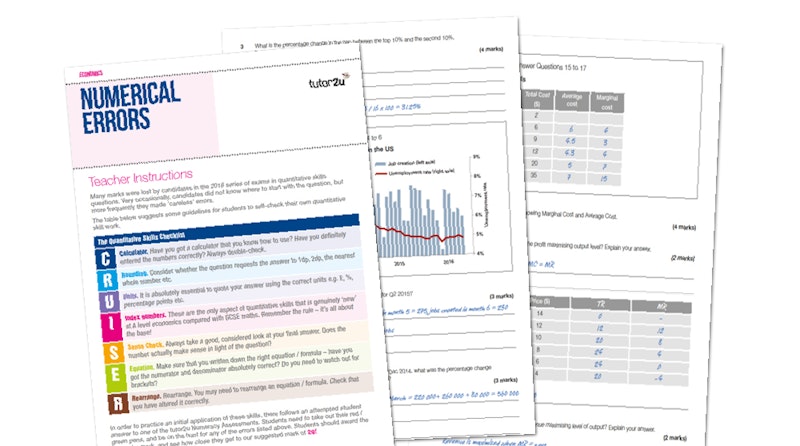Teaching activity
Success in Edexcel (A) A-Level Economics 2019 (CPD)

27th January 2019
A forensic examination of what the principal examiners have said about why A-Level Economics students are under-performing is at the heart of the new resources developed for the upcoming SUCCESS IN EDEXCEL (A) A-LEVEL ECONOMICS CPD course in London on Wednesday 6th February.
The tutor2u Economics team have also interviewed examiners from every paper and performed a detailed analysis of sample scripts from the public feedback process. The result is a series of issues identified that Edexcel students need to address in order to maximise their performance in May & June 2019.
Identifying the issues is one thing, but what can be done about them?
tutor2u commissioned experienced Edexcel Economics teachers and examiners to develop new teaching resources and approaches that are designed to tackle all the issues head-on.
Let’s briefly look at some of these new resources.

Exam case studies and data are provide for a reason! The “Adding Application” resource provides three short exam case studies, a series of exam-style questions and some “textbook” student answers that are perfect in every way – except they don’t have any application! The accompanying task enable students to see and practice how the skill of application can be demonstrated.

Exam feedback from 2018 is that students are struggling with specialist terminology and confusing apparently similar terms. Can students tell the difference between:
- Tax evasion and tax avoidance?
- A budget balance and a current account balance?
- Marginal cost and variable cost?
- Dynamic efficiency and static efficiency?
- A customs union and a free trade area?
Based on a survey of experienced Economics teachers, the new “Confusing Pairs” resource helps students spot those terms most likely to be confused!

One exam board has suggested that around 40% of students missed a grade in 2018 because of the cumulative effect of simple errors on quantitative skills questions. We’ve analysed what those errors are and developed a cracking resource (“Numerical Errors”) to let students discover what those errors are for themselves and – more importantly – how they can be avoided this summer.

“Essay Variations” is a new resource that tackles a common problem – students writing an essay in the exams that is based on one they’ve written before! The essay title might mention the phrase “competition policy”, but that isn’t an invitation to reprise the competition policy essay that was last rolled out in the mocks. “Essay Variations” provides 10 potential essay questions for 5 key micro and 5 macro topic areas, challenging students to consider the differences in them and how they might respond by focusing on the demands of the question.
Last, but not least, the “Analysis Checklist” is a peer-assessment resource that highlights the significant gains that can be enjoyed where students raise their game with analysis. Too many students are analysing at a simplistic level. However, the answer is not just adding more links to the chain of argument. We’ve broken down the skill of analysis into three key areas with accompanying suggestions for peer-review: use of language; content & diagrams.
The Success in Edexcel (A) A-Level Economics 2019 CPD course features all the above resources and much more!
We’ve also embedded the results of the 2018 exam analysis into the session content for the Grade Booster (Year 13) A-Level Economics student workshops running in March, April & May 2019.
You might also like

Short Teaching Presentation on Perfect Competition
16th September 2014

Aggregate Demand and Aggregate Supply Lesson Resource
22nd January 2016

Classroom Activity - Playing a Public Goods Game
2nd October 2012

Classroom Activity: The Oligopoly Game
2nd October 2012

UCAS Guide to Economics Courses & Offers 2015
12th February 2015